Exploring Policy, Power, and Politics in Healthcare at Western Sydney
VerifiedAdded on 2023/06/13
|9
|2394
|342
Essay
AI Summary
This essay delves into the intricate relationship between policy, power, and politics in healthcare provision. It examines the appropriateness of the policy cycle as a tool for policy development, contrasting the 'new' and 'old' public health approaches. The essay further explores key sociological issues affecting individual health, the meaning of 'power' in policy development, and factors to consider when creating a smoke-free university environment. It concludes by highlighting the interconnectedness of policy, power, and politics, emphasizing their impact on decision-making and resource allocation within the healthcare system. Desklib offers similar essays and study resources for students.
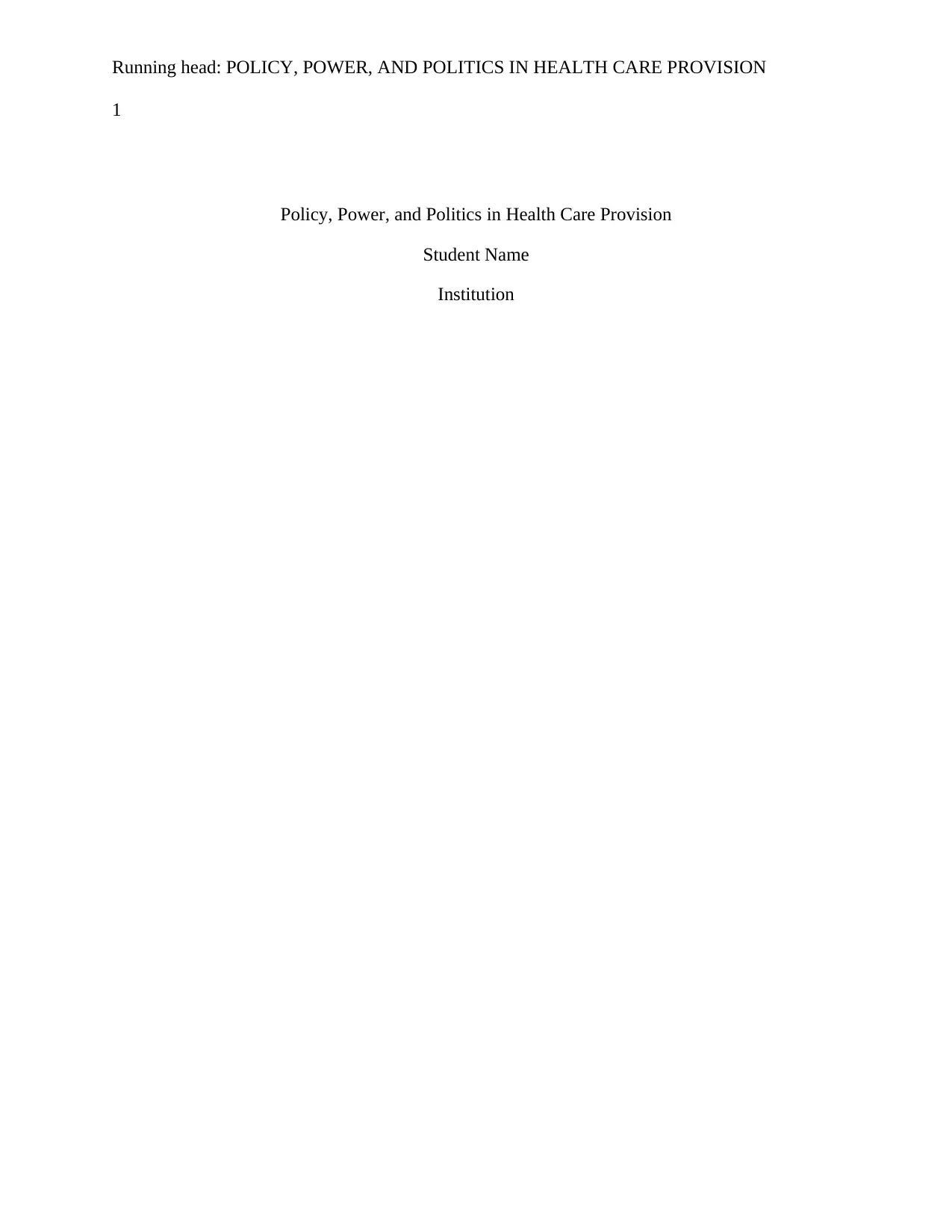
Running head: POLICY, POWER, AND POLITICS IN HEALTH CARE PROVISION
1
Policy, Power, and Politics in Health Care Provision
Student Name
Institution
1
Policy, Power, and Politics in Health Care Provision
Student Name
Institution
Paraphrase This Document
Need a fresh take? Get an instant paraphrase of this document with our AI Paraphraser
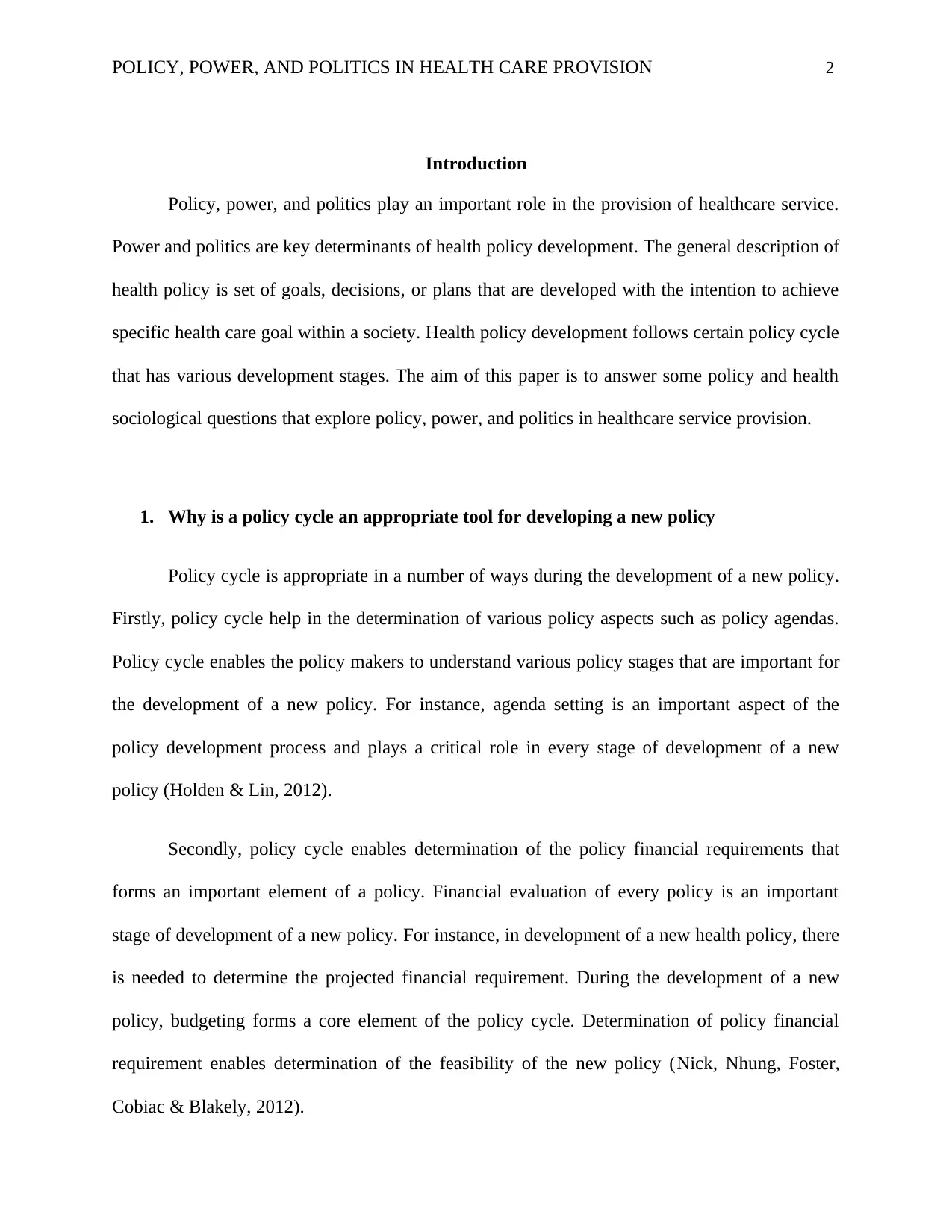
POLICY, POWER, AND POLITICS IN HEALTH CARE PROVISION 2
Introduction
Policy, power, and politics play an important role in the provision of healthcare service.
Power and politics are key determinants of health policy development. The general description of
health policy is set of goals, decisions, or plans that are developed with the intention to achieve
specific health care goal within a society. Health policy development follows certain policy cycle
that has various development stages. The aim of this paper is to answer some policy and health
sociological questions that explore policy, power, and politics in healthcare service provision.
1. Why is a policy cycle an appropriate tool for developing a new policy
Policy cycle is appropriate in a number of ways during the development of a new policy.
Firstly, policy cycle help in the determination of various policy aspects such as policy agendas.
Policy cycle enables the policy makers to understand various policy stages that are important for
the development of a new policy. For instance, agenda setting is an important aspect of the
policy development process and plays a critical role in every stage of development of a new
policy (Holden & Lin, 2012).
Secondly, policy cycle enables determination of the policy financial requirements that
forms an important element of a policy. Financial evaluation of every policy is an important
stage of development of a new policy. For instance, in development of a new health policy, there
is needed to determine the projected financial requirement. During the development of a new
policy, budgeting forms a core element of the policy cycle. Determination of policy financial
requirement enables determination of the feasibility of the new policy (Nick, Nhung, Foster,
Cobiac & Blakely, 2012).
Introduction
Policy, power, and politics play an important role in the provision of healthcare service.
Power and politics are key determinants of health policy development. The general description of
health policy is set of goals, decisions, or plans that are developed with the intention to achieve
specific health care goal within a society. Health policy development follows certain policy cycle
that has various development stages. The aim of this paper is to answer some policy and health
sociological questions that explore policy, power, and politics in healthcare service provision.
1. Why is a policy cycle an appropriate tool for developing a new policy
Policy cycle is appropriate in a number of ways during the development of a new policy.
Firstly, policy cycle help in the determination of various policy aspects such as policy agendas.
Policy cycle enables the policy makers to understand various policy stages that are important for
the development of a new policy. For instance, agenda setting is an important aspect of the
policy development process and plays a critical role in every stage of development of a new
policy (Holden & Lin, 2012).
Secondly, policy cycle enables determination of the policy financial requirements that
forms an important element of a policy. Financial evaluation of every policy is an important
stage of development of a new policy. For instance, in development of a new health policy, there
is needed to determine the projected financial requirement. During the development of a new
policy, budgeting forms a core element of the policy cycle. Determination of policy financial
requirement enables determination of the feasibility of the new policy (Nick, Nhung, Foster,
Cobiac & Blakely, 2012).
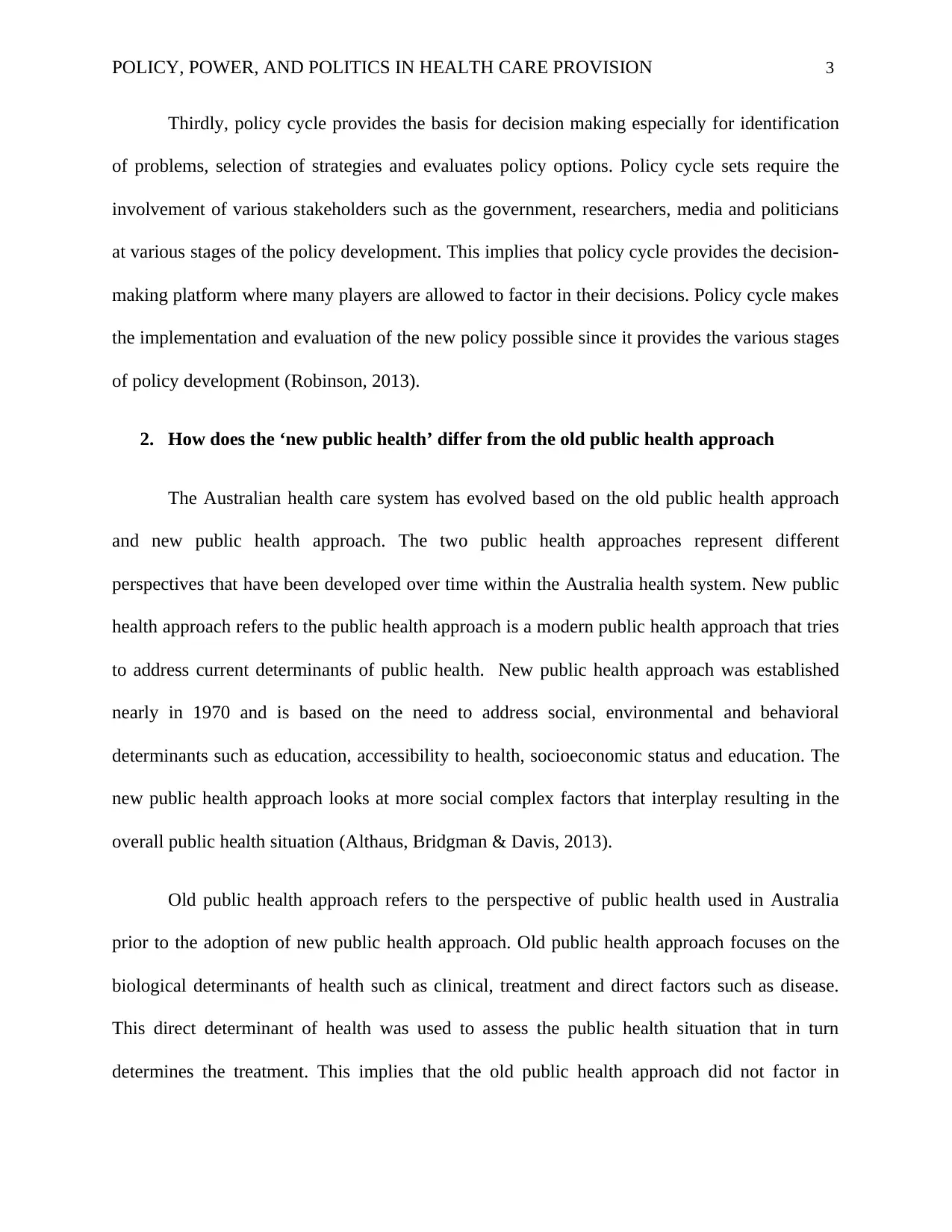
POLICY, POWER, AND POLITICS IN HEALTH CARE PROVISION 3
Thirdly, policy cycle provides the basis for decision making especially for identification
of problems, selection of strategies and evaluates policy options. Policy cycle sets require the
involvement of various stakeholders such as the government, researchers, media and politicians
at various stages of the policy development. This implies that policy cycle provides the decision-
making platform where many players are allowed to factor in their decisions. Policy cycle makes
the implementation and evaluation of the new policy possible since it provides the various stages
of policy development (Robinson, 2013).
2. How does the ‘new public health’ differ from the old public health approach
The Australian health care system has evolved based on the old public health approach
and new public health approach. The two public health approaches represent different
perspectives that have been developed over time within the Australia health system. New public
health approach refers to the public health approach is a modern public health approach that tries
to address current determinants of public health. New public health approach was established
nearly in 1970 and is based on the need to address social, environmental and behavioral
determinants such as education, accessibility to health, socioeconomic status and education. The
new public health approach looks at more social complex factors that interplay resulting in the
overall public health situation (Althaus, Bridgman & Davis, 2013).
Old public health approach refers to the perspective of public health used in Australia
prior to the adoption of new public health approach. Old public health approach focuses on the
biological determinants of health such as clinical, treatment and direct factors such as disease.
This direct determinant of health was used to assess the public health situation that in turn
determines the treatment. This implies that the old public health approach did not factor in
Thirdly, policy cycle provides the basis for decision making especially for identification
of problems, selection of strategies and evaluates policy options. Policy cycle sets require the
involvement of various stakeholders such as the government, researchers, media and politicians
at various stages of the policy development. This implies that policy cycle provides the decision-
making platform where many players are allowed to factor in their decisions. Policy cycle makes
the implementation and evaluation of the new policy possible since it provides the various stages
of policy development (Robinson, 2013).
2. How does the ‘new public health’ differ from the old public health approach
The Australian health care system has evolved based on the old public health approach
and new public health approach. The two public health approaches represent different
perspectives that have been developed over time within the Australia health system. New public
health approach refers to the public health approach is a modern public health approach that tries
to address current determinants of public health. New public health approach was established
nearly in 1970 and is based on the need to address social, environmental and behavioral
determinants such as education, accessibility to health, socioeconomic status and education. The
new public health approach looks at more social complex factors that interplay resulting in the
overall public health situation (Althaus, Bridgman & Davis, 2013).
Old public health approach refers to the perspective of public health used in Australia
prior to the adoption of new public health approach. Old public health approach focuses on the
biological determinants of health such as clinical, treatment and direct factors such as disease.
This direct determinant of health was used to assess the public health situation that in turn
determines the treatment. This implies that the old public health approach did not factor in
⊘ This is a preview!⊘
Do you want full access?
Subscribe today to unlock all pages.

Trusted by 1+ million students worldwide
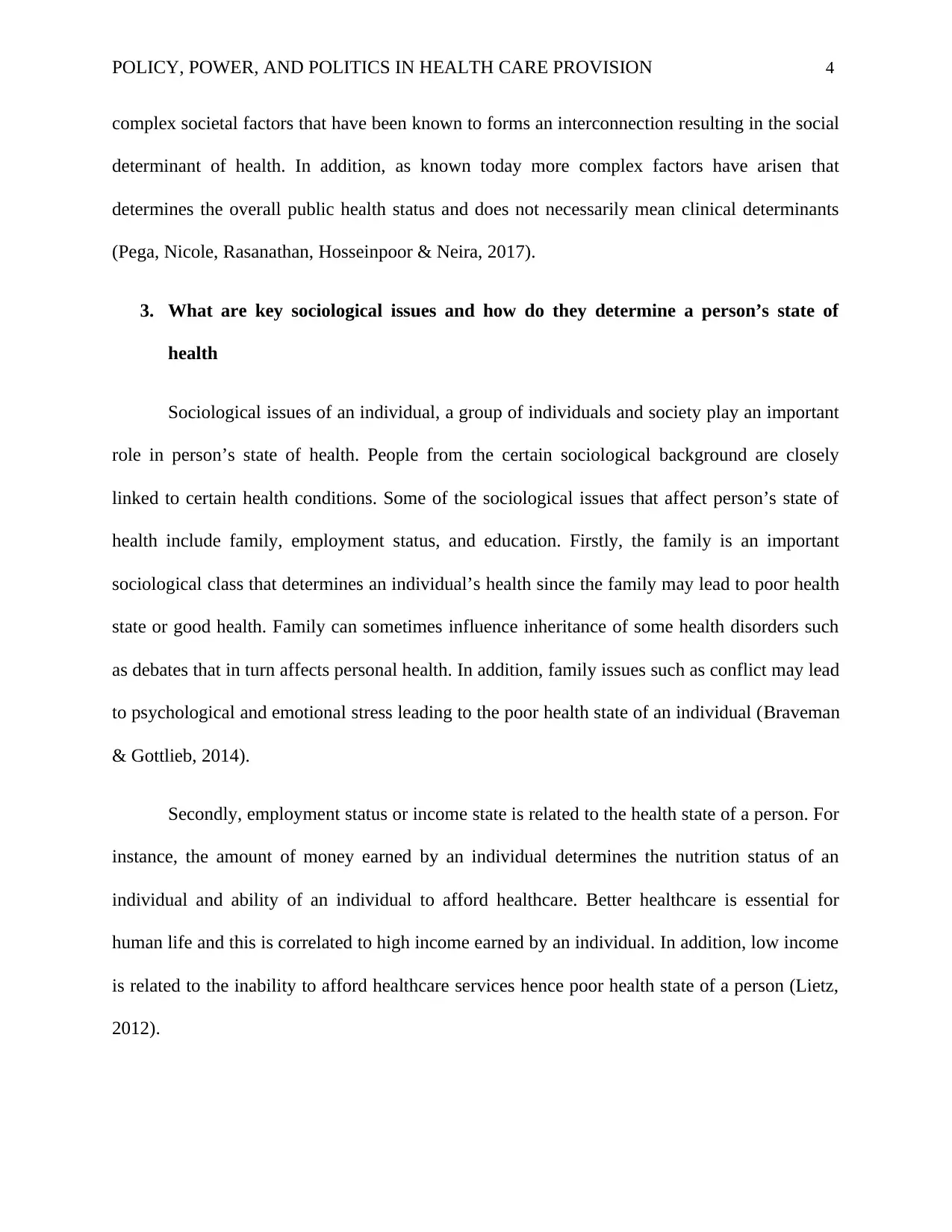
POLICY, POWER, AND POLITICS IN HEALTH CARE PROVISION 4
complex societal factors that have been known to forms an interconnection resulting in the social
determinant of health. In addition, as known today more complex factors have arisen that
determines the overall public health status and does not necessarily mean clinical determinants
(Pega, Nicole, Rasanathan, Hosseinpoor & Neira, 2017).
3. What are key sociological issues and how do they determine a person’s state of
health
Sociological issues of an individual, a group of individuals and society play an important
role in person’s state of health. People from the certain sociological background are closely
linked to certain health conditions. Some of the sociological issues that affect person’s state of
health include family, employment status, and education. Firstly, the family is an important
sociological class that determines an individual’s health since the family may lead to poor health
state or good health. Family can sometimes influence inheritance of some health disorders such
as debates that in turn affects personal health. In addition, family issues such as conflict may lead
to psychological and emotional stress leading to the poor health state of an individual (Braveman
& Gottlieb, 2014).
Secondly, employment status or income state is related to the health state of a person. For
instance, the amount of money earned by an individual determines the nutrition status of an
individual and ability of an individual to afford healthcare. Better healthcare is essential for
human life and this is correlated to high income earned by an individual. In addition, low income
is related to the inability to afford healthcare services hence poor health state of a person (Lietz,
2012).
complex societal factors that have been known to forms an interconnection resulting in the social
determinant of health. In addition, as known today more complex factors have arisen that
determines the overall public health status and does not necessarily mean clinical determinants
(Pega, Nicole, Rasanathan, Hosseinpoor & Neira, 2017).
3. What are key sociological issues and how do they determine a person’s state of
health
Sociological issues of an individual, a group of individuals and society play an important
role in person’s state of health. People from the certain sociological background are closely
linked to certain health conditions. Some of the sociological issues that affect person’s state of
health include family, employment status, and education. Firstly, the family is an important
sociological class that determines an individual’s health since the family may lead to poor health
state or good health. Family can sometimes influence inheritance of some health disorders such
as debates that in turn affects personal health. In addition, family issues such as conflict may lead
to psychological and emotional stress leading to the poor health state of an individual (Braveman
& Gottlieb, 2014).
Secondly, employment status or income state is related to the health state of a person. For
instance, the amount of money earned by an individual determines the nutrition status of an
individual and ability of an individual to afford healthcare. Better healthcare is essential for
human life and this is correlated to high income earned by an individual. In addition, low income
is related to the inability to afford healthcare services hence poor health state of a person (Lietz,
2012).
Paraphrase This Document
Need a fresh take? Get an instant paraphrase of this document with our AI Paraphraser
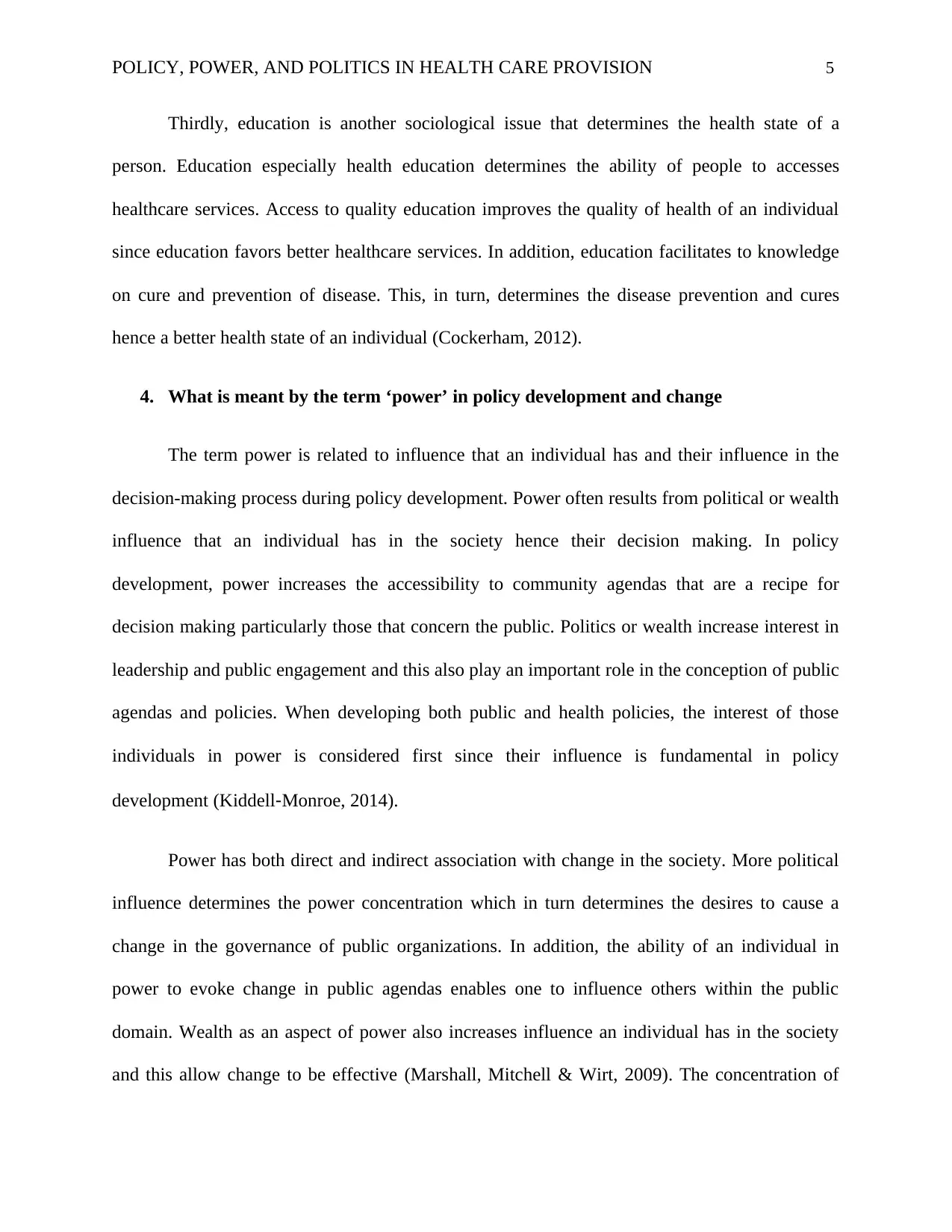
POLICY, POWER, AND POLITICS IN HEALTH CARE PROVISION 5
Thirdly, education is another sociological issue that determines the health state of a
person. Education especially health education determines the ability of people to accesses
healthcare services. Access to quality education improves the quality of health of an individual
since education favors better healthcare services. In addition, education facilitates to knowledge
on cure and prevention of disease. This, in turn, determines the disease prevention and cures
hence a better health state of an individual (Cockerham, 2012).
4. What is meant by the term ‘power’ in policy development and change
The term power is related to influence that an individual has and their influence in the
decision-making process during policy development. Power often results from political or wealth
influence that an individual has in the society hence their decision making. In policy
development, power increases the accessibility to community agendas that are a recipe for
decision making particularly those that concern the public. Politics or wealth increase interest in
leadership and public engagement and this also play an important role in the conception of public
agendas and policies. When developing both public and health policies, the interest of those
individuals in power is considered first since their influence is fundamental in policy
development (Kiddell‐Monroe, 2014).
Power has both direct and indirect association with change in the society. More political
influence determines the power concentration which in turn determines the desires to cause a
change in the governance of public organizations. In addition, the ability of an individual in
power to evoke change in public agendas enables one to influence others within the public
domain. Wealth as an aspect of power also increases influence an individual has in the society
and this allow change to be effective (Marshall, Mitchell & Wirt, 2009). The concentration of
Thirdly, education is another sociological issue that determines the health state of a
person. Education especially health education determines the ability of people to accesses
healthcare services. Access to quality education improves the quality of health of an individual
since education favors better healthcare services. In addition, education facilitates to knowledge
on cure and prevention of disease. This, in turn, determines the disease prevention and cures
hence a better health state of an individual (Cockerham, 2012).
4. What is meant by the term ‘power’ in policy development and change
The term power is related to influence that an individual has and their influence in the
decision-making process during policy development. Power often results from political or wealth
influence that an individual has in the society hence their decision making. In policy
development, power increases the accessibility to community agendas that are a recipe for
decision making particularly those that concern the public. Politics or wealth increase interest in
leadership and public engagement and this also play an important role in the conception of public
agendas and policies. When developing both public and health policies, the interest of those
individuals in power is considered first since their influence is fundamental in policy
development (Kiddell‐Monroe, 2014).
Power has both direct and indirect association with change in the society. More political
influence determines the power concentration which in turn determines the desires to cause a
change in the governance of public organizations. In addition, the ability of an individual in
power to evoke change in public agendas enables one to influence others within the public
domain. Wealth as an aspect of power also increases influence an individual has in the society
and this allow change to be effective (Marshall, Mitchell & Wirt, 2009). The concentration of
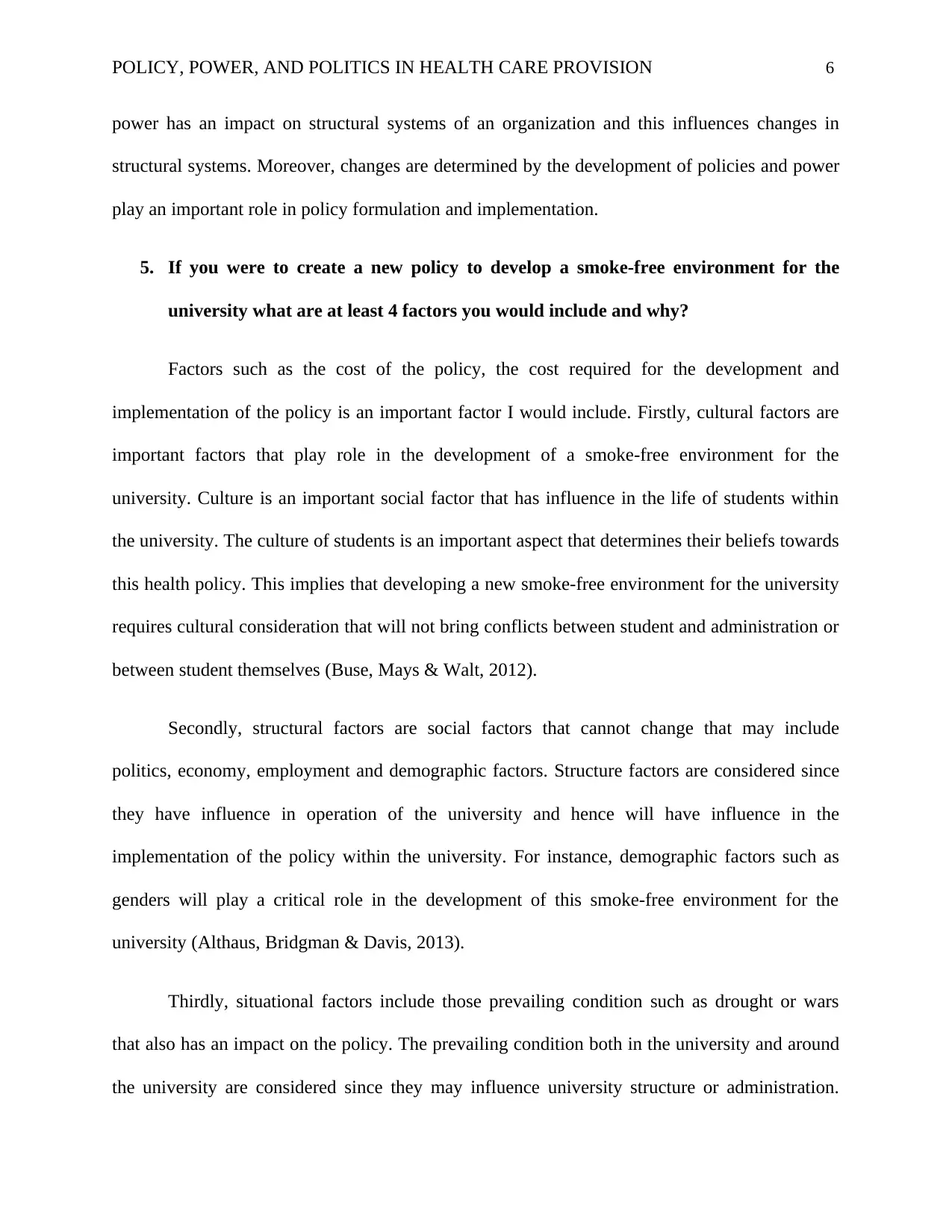
POLICY, POWER, AND POLITICS IN HEALTH CARE PROVISION 6
power has an impact on structural systems of an organization and this influences changes in
structural systems. Moreover, changes are determined by the development of policies and power
play an important role in policy formulation and implementation.
5. If you were to create a new policy to develop a smoke-free environment for the
university what are at least 4 factors you would include and why?
Factors such as the cost of the policy, the cost required for the development and
implementation of the policy is an important factor I would include. Firstly, cultural factors are
important factors that play role in the development of a smoke-free environment for the
university. Culture is an important social factor that has influence in the life of students within
the university. The culture of students is an important aspect that determines their beliefs towards
this health policy. This implies that developing a new smoke-free environment for the university
requires cultural consideration that will not bring conflicts between student and administration or
between student themselves (Buse, Mays & Walt, 2012).
Secondly, structural factors are social factors that cannot change that may include
politics, economy, employment and demographic factors. Structure factors are considered since
they have influence in operation of the university and hence will have influence in the
implementation of the policy within the university. For instance, demographic factors such as
genders will play a critical role in the development of this smoke-free environment for the
university (Althaus, Bridgman & Davis, 2013).
Thirdly, situational factors include those prevailing condition such as drought or wars
that also has an impact on the policy. The prevailing condition both in the university and around
the university are considered since they may influence university structure or administration.
power has an impact on structural systems of an organization and this influences changes in
structural systems. Moreover, changes are determined by the development of policies and power
play an important role in policy formulation and implementation.
5. If you were to create a new policy to develop a smoke-free environment for the
university what are at least 4 factors you would include and why?
Factors such as the cost of the policy, the cost required for the development and
implementation of the policy is an important factor I would include. Firstly, cultural factors are
important factors that play role in the development of a smoke-free environment for the
university. Culture is an important social factor that has influence in the life of students within
the university. The culture of students is an important aspect that determines their beliefs towards
this health policy. This implies that developing a new smoke-free environment for the university
requires cultural consideration that will not bring conflicts between student and administration or
between student themselves (Buse, Mays & Walt, 2012).
Secondly, structural factors are social factors that cannot change that may include
politics, economy, employment and demographic factors. Structure factors are considered since
they have influence in operation of the university and hence will have influence in the
implementation of the policy within the university. For instance, demographic factors such as
genders will play a critical role in the development of this smoke-free environment for the
university (Althaus, Bridgman & Davis, 2013).
Thirdly, situational factors include those prevailing condition such as drought or wars
that also has an impact on the policy. The prevailing condition both in the university and around
the university are considered since they may influence university structure or administration.
⊘ This is a preview!⊘
Do you want full access?
Subscribe today to unlock all pages.

Trusted by 1+ million students worldwide
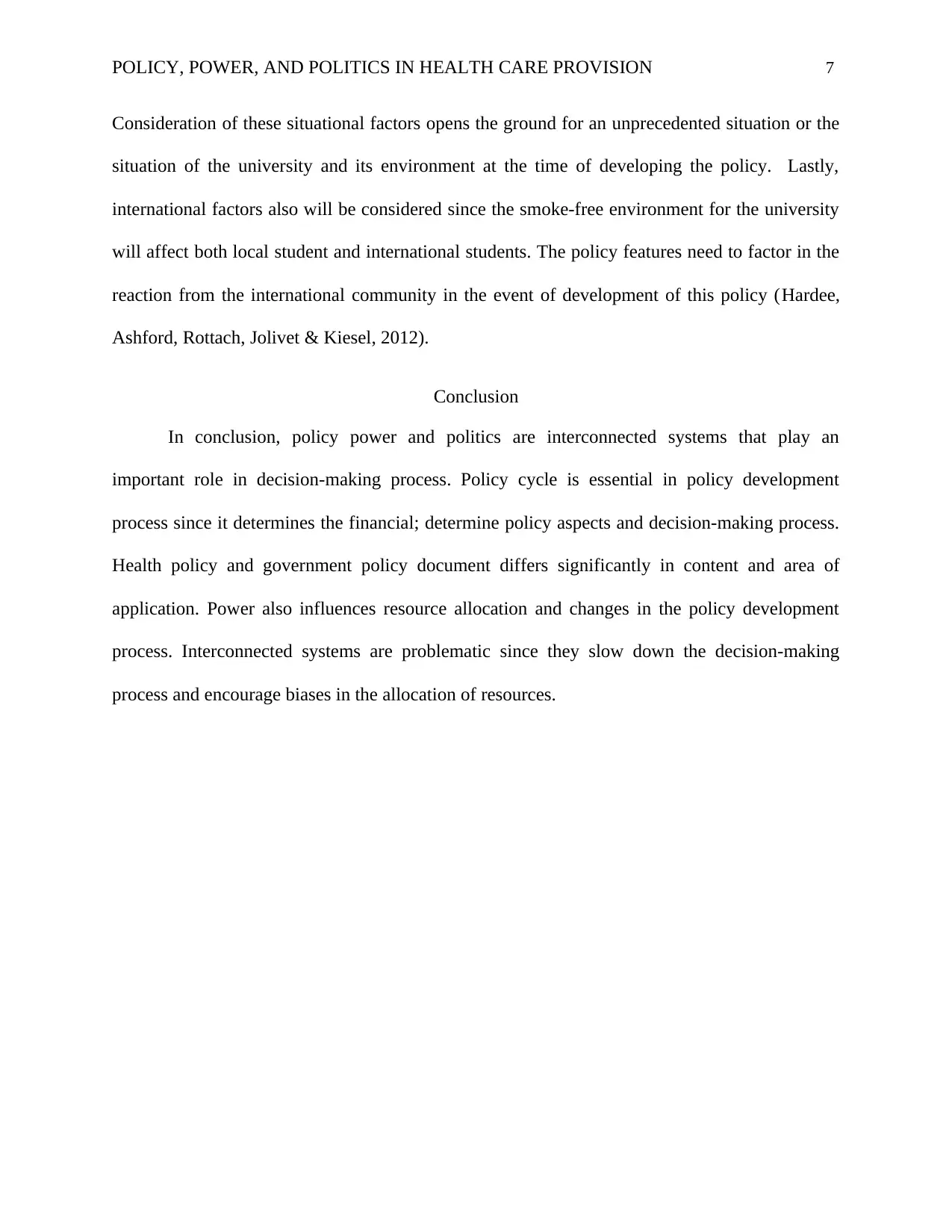
POLICY, POWER, AND POLITICS IN HEALTH CARE PROVISION 7
Consideration of these situational factors opens the ground for an unprecedented situation or the
situation of the university and its environment at the time of developing the policy. Lastly,
international factors also will be considered since the smoke-free environment for the university
will affect both local student and international students. The policy features need to factor in the
reaction from the international community in the event of development of this policy (Hardee,
Ashford, Rottach, Jolivet & Kiesel, 2012).
Conclusion
In conclusion, policy power and politics are interconnected systems that play an
important role in decision-making process. Policy cycle is essential in policy development
process since it determines the financial; determine policy aspects and decision-making process.
Health policy and government policy document differs significantly in content and area of
application. Power also influences resource allocation and changes in the policy development
process. Interconnected systems are problematic since they slow down the decision-making
process and encourage biases in the allocation of resources.
Consideration of these situational factors opens the ground for an unprecedented situation or the
situation of the university and its environment at the time of developing the policy. Lastly,
international factors also will be considered since the smoke-free environment for the university
will affect both local student and international students. The policy features need to factor in the
reaction from the international community in the event of development of this policy (Hardee,
Ashford, Rottach, Jolivet & Kiesel, 2012).
Conclusion
In conclusion, policy power and politics are interconnected systems that play an
important role in decision-making process. Policy cycle is essential in policy development
process since it determines the financial; determine policy aspects and decision-making process.
Health policy and government policy document differs significantly in content and area of
application. Power also influences resource allocation and changes in the policy development
process. Interconnected systems are problematic since they slow down the decision-making
process and encourage biases in the allocation of resources.
Paraphrase This Document
Need a fresh take? Get an instant paraphrase of this document with our AI Paraphraser
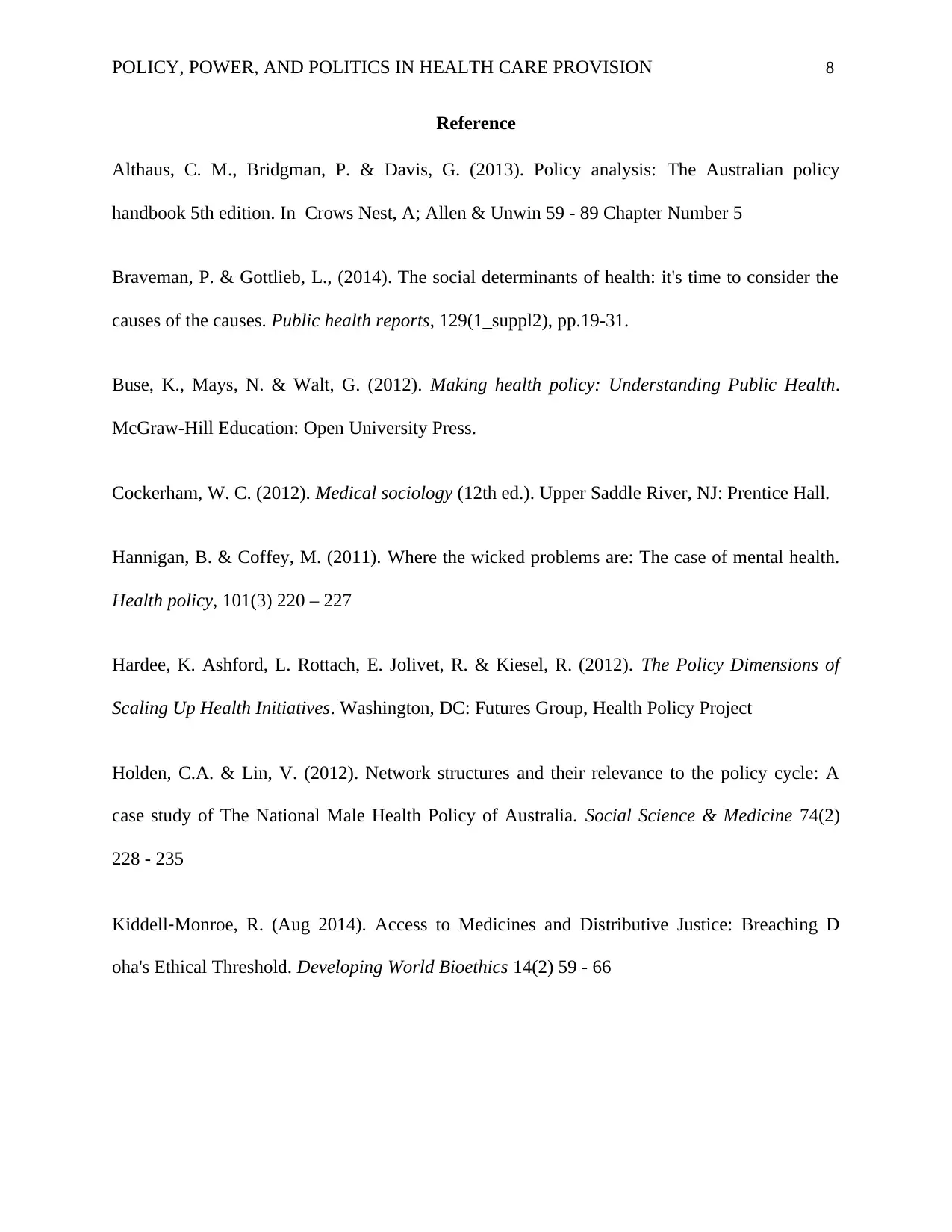
POLICY, POWER, AND POLITICS IN HEALTH CARE PROVISION 8
Reference
Althaus, C. M., Bridgman, P. & Davis, G. (2013). Policy analysis: The Australian policy
handbook 5th edition. In Crows Nest, A; Allen & Unwin 59 - 89 Chapter Number 5
Braveman, P. & Gottlieb, L., (2014). The social determinants of health: it's time to consider the
causes of the causes. Public health reports, 129(1_suppl2), pp.19-31.
Buse, K., Mays, N. & Walt, G. (2012). Making health policy: Understanding Public Health.
McGraw-Hill Education: Open University Press.
Cockerham, W. C. (2012). Medical sociology (12th ed.). Upper Saddle River, NJ: Prentice Hall.
Hannigan, B. & Coffey, M. (2011). Where the wicked problems are: The case of mental health.
Health policy, 101(3) 220 – 227
Hardee, K. Ashford, L. Rottach, E. Jolivet, R. & Kiesel, R. (2012). The Policy Dimensions of
Scaling Up Health Initiatives. Washington, DC: Futures Group, Health Policy Project
Holden, C.A. & Lin, V. (2012). Network structures and their relevance to the policy cycle: A
case study of The National Male Health Policy of Australia. Social Science & Medicine 74(2)
228 - 235
Kiddell‐Monroe, R. (Aug 2014). Access to Medicines and Distributive Justice: Breaching D
oha's Ethical Threshold. Developing World Bioethics 14(2) 59 - 66
Reference
Althaus, C. M., Bridgman, P. & Davis, G. (2013). Policy analysis: The Australian policy
handbook 5th edition. In Crows Nest, A; Allen & Unwin 59 - 89 Chapter Number 5
Braveman, P. & Gottlieb, L., (2014). The social determinants of health: it's time to consider the
causes of the causes. Public health reports, 129(1_suppl2), pp.19-31.
Buse, K., Mays, N. & Walt, G. (2012). Making health policy: Understanding Public Health.
McGraw-Hill Education: Open University Press.
Cockerham, W. C. (2012). Medical sociology (12th ed.). Upper Saddle River, NJ: Prentice Hall.
Hannigan, B. & Coffey, M. (2011). Where the wicked problems are: The case of mental health.
Health policy, 101(3) 220 – 227
Hardee, K. Ashford, L. Rottach, E. Jolivet, R. & Kiesel, R. (2012). The Policy Dimensions of
Scaling Up Health Initiatives. Washington, DC: Futures Group, Health Policy Project
Holden, C.A. & Lin, V. (2012). Network structures and their relevance to the policy cycle: A
case study of The National Male Health Policy of Australia. Social Science & Medicine 74(2)
228 - 235
Kiddell‐Monroe, R. (Aug 2014). Access to Medicines and Distributive Justice: Breaching D
oha's Ethical Threshold. Developing World Bioethics 14(2) 59 - 66
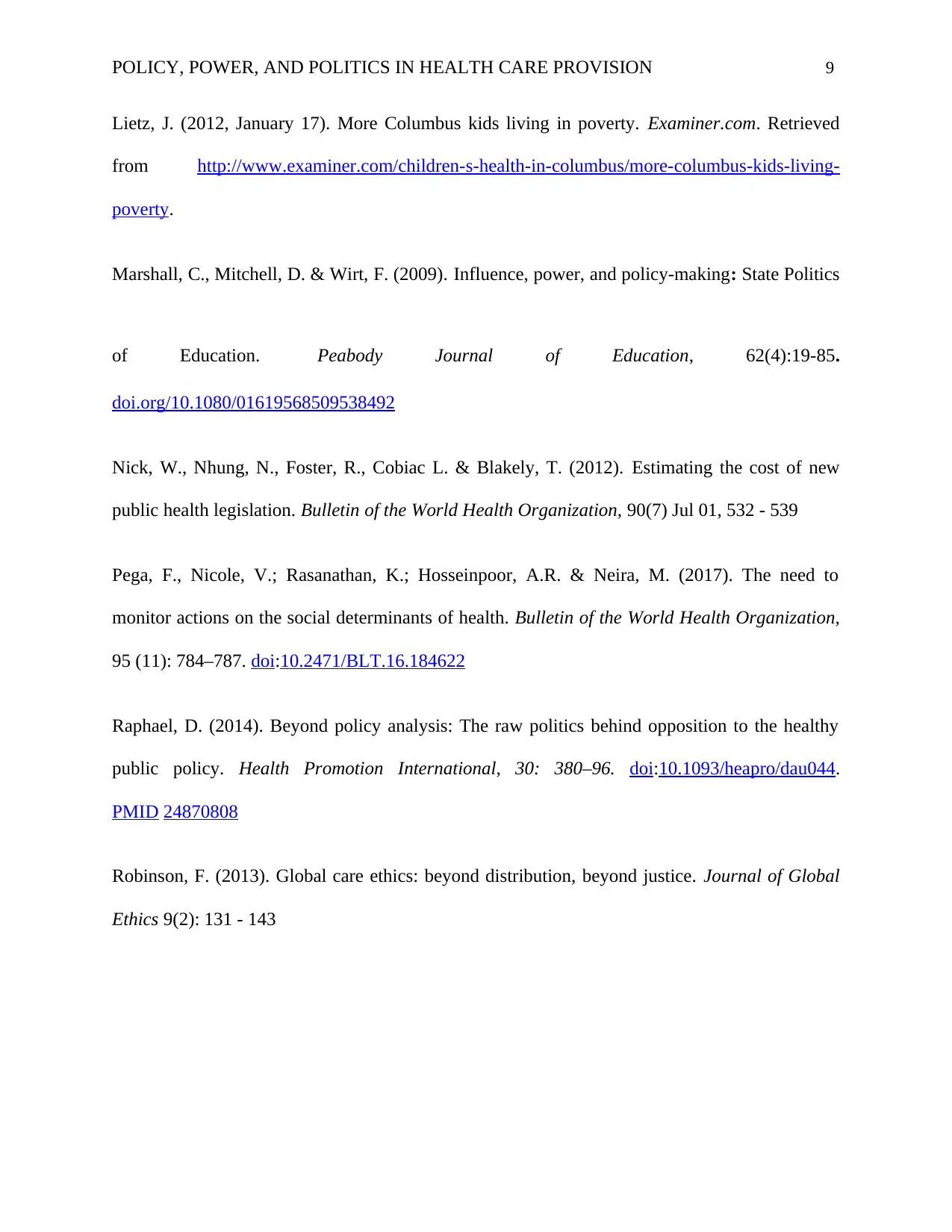
POLICY, POWER, AND POLITICS IN HEALTH CARE PROVISION 9
Lietz, J. (2012, January 17). More Columbus kids living in poverty. Examiner.com. Retrieved
from http://www.examiner.com/children-s-health-in-columbus/more-columbus-kids-living-
poverty.
Marshall, C., Mitchell, D. & Wirt, F. (2009). Influence, power, and policy-making: State Politics
of Education. Peabody Journal of Education, 62(4):19-85.
doi.org/10.1080/01619568509538492
Nick, W., Nhung, N., Foster, R., Cobiac L. & Blakely, T. (2012). Estimating the cost of new
public health legislation. Bulletin of the World Health Organization, 90(7) Jul 01, 532 - 539
Pega, F., Nicole, V.; Rasanathan, K.; Hosseinpoor, A.R. & Neira, M. (2017). The need to
monitor actions on the social determinants of health. Bulletin of the World Health Organization,
95 (11): 784–787. doi:10.2471/BLT.16.184622
Raphael, D. (2014). Beyond policy analysis: The raw politics behind opposition to the healthy
public policy. Health Promotion International, 30: 380–96. doi:10.1093/heapro/dau044.
PMID 24870808
Robinson, F. (2013). Global care ethics: beyond distribution, beyond justice. Journal of Global
Ethics 9(2): 131 - 143
Lietz, J. (2012, January 17). More Columbus kids living in poverty. Examiner.com. Retrieved
from http://www.examiner.com/children-s-health-in-columbus/more-columbus-kids-living-
poverty.
Marshall, C., Mitchell, D. & Wirt, F. (2009). Influence, power, and policy-making: State Politics
of Education. Peabody Journal of Education, 62(4):19-85.
doi.org/10.1080/01619568509538492
Nick, W., Nhung, N., Foster, R., Cobiac L. & Blakely, T. (2012). Estimating the cost of new
public health legislation. Bulletin of the World Health Organization, 90(7) Jul 01, 532 - 539
Pega, F., Nicole, V.; Rasanathan, K.; Hosseinpoor, A.R. & Neira, M. (2017). The need to
monitor actions on the social determinants of health. Bulletin of the World Health Organization,
95 (11): 784–787. doi:10.2471/BLT.16.184622
Raphael, D. (2014). Beyond policy analysis: The raw politics behind opposition to the healthy
public policy. Health Promotion International, 30: 380–96. doi:10.1093/heapro/dau044.
PMID 24870808
Robinson, F. (2013). Global care ethics: beyond distribution, beyond justice. Journal of Global
Ethics 9(2): 131 - 143
⊘ This is a preview!⊘
Do you want full access?
Subscribe today to unlock all pages.

Trusted by 1+ million students worldwide
1 out of 9
Related Documents
Your All-in-One AI-Powered Toolkit for Academic Success.
+13062052269
info@desklib.com
Available 24*7 on WhatsApp / Email
![[object Object]](/_next/static/media/star-bottom.7253800d.svg)
Unlock your academic potential
Copyright © 2020–2026 A2Z Services. All Rights Reserved. Developed and managed by ZUCOL.




